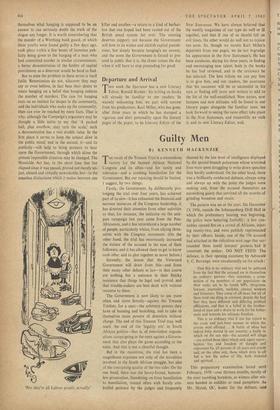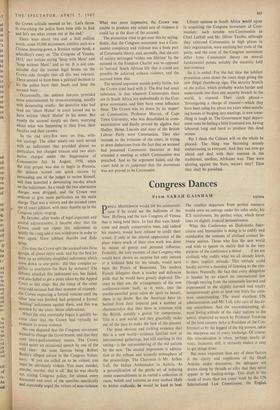Guilty Men
By KENNETH MACKENZIE fr HE result of the Treason Trial is a tremendous .1 victory for the banned African National Congress and its allies—and for sanity and tolerance—and a crushing humiliation for the Government. But our rejoicing should be limited, I suggest, by two things.
Firstly, the Government, by deliberately pro- longing the trial over four years, has achieved part of its aim—it has exhausted the financial and nervous resources of the Congress leadership, it has diverted their attention from other activities so that, for instance, the initiative on the anti- pass campaign last year came from the Pan- Africanists, and it has intimidated a large number of people, particularly whites, from allying them- selves with the Congress movement. (On the other hand, the trial has enormously increased the stature of the accused in the eyes of their followers, and it has allowed them to get to know each other and to plot together as never before.) Secondly, the lesson that the Verwoerd Government will draw from this—and from their many other defeats at law—is that courts are nothing but a nuisance in their finicky insistence that things be legal and proved, and that trouble-makers are best dealt with without recourse to them.
The Government is now likely to use more often and more fiercely—against the Treason Trialists, for a start—the arbitrary powers they have of banning and banishing, and to take to themselves more powers of detention without charge. The end of this Treason Trial may well mark the end of the 'legality era'. in South African politics—that is, of non-violent organis- ations campaigning in the open against a Govern- ment that also plays the game according to the rules. And that is not a cheerful thought.
But in the meantime, the trial has been a magnificent exposure not only of the moralities involved in the South African struggle, but also of the contrasting quality of the two sides. On the one hand, there was the heavy-footed, humour- less prosecution, blundering on from humiliation to humiliation, treated often with barely con- trolled patience by the judges and frequently shamed by the low level of intelligence displayed by the special-branch policemen whose wretched lives were spent struggling to write down speeches they hardly understood. On the other hand, there was a brilliantly conducted defence, always witty and always up with the point the judges were making and, from the accused themselves an astonishing gaiety that survived all the months of grinding boredom and strain.
The pattern was set at the start. On December 19, 1956, outside the Johannesburg Drill Hall in which the preliminary hearing was beginning, the police were behaving foolishly: a few con- stables opened fire on a crowd of Africans, injur- ing twenty-two, and were publicly reprimanded by their officers. Inside, one of the 156 accused had attached to the ridiculous wire cage that sur- rounded them (until lawyers' protests had it removed) the notice: DO NOT FEED The defence, in their opening statement by Advocate V. C. Berrange, were unashamedly on the attack :
That this is no ordinary trial can be gathered from the fact that the accused arc in themselves no ordinary persons—they constitute a cross- section of the members of our population—in their ranks are to be found MPs, clergymen, lawyers, journalists, students, clerical workers and labourers. They come of all races but all of them hold one thing in common, despite the fact that they have different and differing political affiliations, and that is a belief in the brother- hood of man and a desire to work for his better- ment and towards his ultimate freedom.
This is no ordinary trial if one has regard to the crude and jack-boot manner in which the arrests were effected ... A battle of ideas has indeed been started in our country; a battle in which on the one side—the accused will allege —arc poised those ideas which seek equal oppor- tunities for, and freedom of thought and expression by, all persons of all races and creeds and, on the other side, those which deny to all but a few the riches of life, both material and spiritual. . . .
This preparatory examination lasted until February, 1958—over thirteen months, mostly of the most numbing boredom, as witness after wit- ness handed in exhibits or read pamphlets. As Mr. Maisel, QC, leader for the defence, said the Crown attitude seemed to be: 'Let's throw in everything the police have been able to find and let's see what comes out at the end.'
There were about two and a half million words, some 10,000 documents, exhibits such as a Chinese dressing-gown, a Russian recipe book, a schoolboy's essay on 'The Congress of Vienna, 1815,' two notices saying 'Soup with Meat' and 'Soup without Meat,' and so on. It is not con- ceivable that the trained legal brains on the Crown side thought that all this was relevant. There seemed to have been a political decision to let the police have their heads and keep the accused busy.
Occasionally, the defence lawyers provided some entertainment by cross-examining, usually with devastating results: the detective who had read out 'shoot Malan' in court turned out to have written 'check Malan' in his notes. But mostly the accused simply sat there, worrying about what was happening to their lives, their families and their careers.
In the end sixty-five were set free, with- out apology. The other ninety-one were served With an indictment that provided almost no particulars, but charged treason and two alter- native charges under the Suppression of Communism Act. In August, 1958, when the trial proper was due to begin in Pretoria, the defence scored one quick success by persuading one of the judges to recuse himself, and then launched a devastating ten-day attack on the indictment. As a result the two alternative charges were dropped, and the Crown was ordered to give more particulars on the main charge. That was a victory and the accused came got of court jubilant, with their thumbs up in the Congress salute, singing.
BY October, after weeks of legal argument and several adjournments, it became clear that the Crown could not repair this indictntent to sptisfy the cour; and it was withdrawn in order to start again. More jubilant thumbs and Zulu spngs.
This time the Crown split the accused into three 40ups, of about thirty each, and for the first lot drew up an infinitely simplified indictment which came down to one point : did they conspire to- gether to overthrow the State by violence? The defence attacked this indictment too, but failed, and also failed to get a point taken by the Appeal Court at this stage. But the rump of the other sixty-odd accused had their moment of triumph : the Crown expecting a formal remand until the other case was finished had prepared a formal holding' indictment against them, and this was quashed by the court. More celebrations.
When the trial eventually began it quickly be- came clear that the Crown had virtually no evidence to prove violence. No one disputed that the Congress movement wanted to change the Government, and that they used extra-parliamentary means. The Crown could quote an occasional speech by one of the wild men : the most famous being Robert Resha's alleged advice to the Congress Volun- teers: 'If you are called on to be violent, you must be absolutely violent. You must murder, murder, murder, that is all.' But he was clearly not stating Congress policy, for almost every document and most of the speeches specifically and repeatedly urged the virtues of non-violence. What was more impressive, the Crown was unable to produce any actual acts of violence it could lay at the door of the accused.
The prosecutor tried to get over this.by saying, firstly, that the Congress movement was a Com- munist conspiracy and violence was a basic part of Communist theory, and, secondly, that the sort of society envisaged 'within our lifetime' by the accused in the Freedom Charter was so-opposed to 'normal' South African life that it could not possibly be achieved without violence, and the accused knew this.
The second argument sounds pretty feeble, but the Crown tried hard with it. The first had some substance, in that whatever Communists there are in South Africa are undoubtedly in the Con- gress movement, and they have some influence there. The Crown was let down by its 'expert' on Communism, Professor Murray, of Cape Town University, who was demolished in cross- examination and finally proved by algebra that Shelley, Heine, Lincoln and most of the British Labour Party were Communists. They also insisted, to the irritation of the court, in trying to draw deductions from the fact that an accused had possessed Communist literature or had attended a meeting at which Communism was preached. And so the argument failed, and the court held in its judgment that the movement was not proved to be Communist. Liberal opinion in South Africa would agree in acquitting the Congress movement of Com- munism: such notable non-Communists as Chief Luthuli and Mr. Oliver Tambo, although they tolerated Communists in high places in their organisation, were anything but tools of the party, and the aims of the Congress movement differ from Communist theory on several fundamental points, notably the sincerely held non-violence.
So it is ended. For the last time the jubilant procession came down the court steps giving the new illegal thumbs-up sign. The security branch of the police, which probably works harder and understands less than any security branch in the world, is exposed. Their catch phrase— `Investigating a charge of treason'—which they have been using for about ten years when search- ing houses or barging into meetings, is now some- thing to laugh at. The Government legal depart- ment must be feeling a little frustrated too, having laboured long and hard to produce this dead mouse.
But I think the Cabinet will on the whole be pleased. The thing was becoming acutely embarrassing to everyone. And they can now go ahead and deal with their enemies in the traditional, uneffete, Afrikaner way. They were plotting against the State, weren't they? Then they shall be punished.







































 Previous page
Previous page